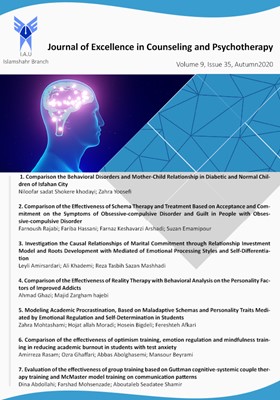Comparison of the Effectiveness of Schema Therapy and Treatment Based on Acceptance and Commitment on the Symptoms of Obsessive-compulsive Disorder and Guilt in People with Obsessive-compulsive Disorder
Subject Areas : Journal of Excellence in Counseling and PsychotherapyFarnoush Rajabi 1 , Fariba Hassani 2 * , Farnaz Keshavarzi Arshadi 3 , Suzan Emamipour 4
1 - Department of Psychology, Central Tehran Branch, Islamic Azad University, Tehran, Iran
2 - Department of Psychology, Central Tehran Branch, Islamic Azad University, Tehran, Iran
3 - Department of Psychology, Central Tehran Branch, Islamic Azad University, Tehran, Iran
4 - Department of Psychology, Central Tehran Branch, Islamic Azad University, Tehran, Iran
Keywords: guilt feeling, Schema Therapy, acceptance and commitment therapy, Obsessive-Compulsive Syndrome,
Abstract :
Purpose: The purpose of this study was to compare the efficacy of schema therapy and acceptance and commitment therapy on obsessive-compulsive disorder and guilt in patients with obsessive-compulsive disorder. Methodology: This is a quasi-experimental study with pre-test, post-test, three groups. The statistical population included all patients with obsessive-compulsive disorder in Dezful in 1397. The study sample included 45 patients with the disorder. It was obsessive-compulsive. The sample was selected by purposeful sampling from the statistical population. They were randomly assigned to one of three groups based on treatment, acceptance and commitment, schema therapy and control (15 individuals in each group). The three groups thus formed were similar and measurements were made for both experimental groups at one time. The research tool is Padua Forced Syndrome Scale (1980) and the Kogler & Jones Guilt Questionnaire (1992). Data were analyzed using repeated measures analysis of variance. Findings: The results of data analysis showed that the effectiveness of acceptance and commitment therapy was more effective in reducing obsessive-compulsive disorder in patients with obsessive-compulsive disorder (P <0.05). Conclusion: Also, the effectiveness of acceptance and commitment therapy based on guilt was more than schema therapy (p <0.05).
_||_

